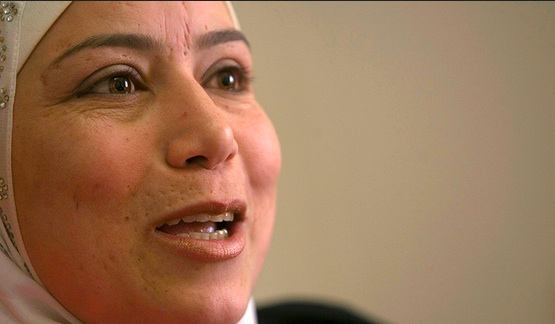Ahmad Melhem writes: For centuries, men in the Arab world have dominated important state positions, such as in the Sharia judiciary — which settles status issues, such as orphan care, divorce, custody and inheritance among others, based on Islamic legislation. Then Palestinian attorney Kholoud al-Faqih defied the “norms” and decided to open that closed door, becoming the first woman to occupy the position of Sharia judge and to walk down that ambitious path.
On Feb. 15, 2009, a huge surprise was in store for Palestine. President Mahmoud Abbas issued a presidential decree appointing Faqih to the Sharia judiciary. This constituted an unprecedented move in Palestine and the Arab world, as the position was generally monopolized by men.
In 2001, Faqih received her license from the chief justice’s office, which granted Faqih her license to practice Sharia law, and she also received her license to practice civil law from the Palestinian Lawyer’s Union. She then worked as an adviser in several women’s organizations and as a defense attorney for women in legal and Sharia courts.
Regarding her interest in becoming a Sharia judge, Faqih said that she noticed during her work the absence of women in the Sharia judiciary. This prompted her to search for the underlying reason and prepare a legal and Sharia study regarding the obstacles, according to the 1976 Jordanian personal status law applicable in Palestine since the West Bank was administratively affiliated with Jordan. She could not find any legal or Sharia text forbidding women from working in the judiciary. So, she moved forward in her endeavors.
Faqih added that the judiciary position was restricted to men due to social norms that favor men over women in Arab societies. She submitted the study she had conducted to then-Chief Islamic Judge Sheikh Taysir al-Tamimi. “When I told him I wanted to become a Sharia judge, he looked shocked at first,” she said, “but I immediately showed him proof that there is nothing in law or Sharia forbidding me from practicing this job, according to the four schools of thought in Islamic jurisprudence or fiqh and as per the Jordanian law applicable in Palestine.”
Regarding her ambition to become a Sharia judge, Faqih said, “I have noticed throughout my work the absence of women in the Sharia judiciary, which prompted me to investigate the reasons behind this and to carry out legal and Sharia research about the obstacles in this regard as per the Jordanian law in force in Palestine. I did not find any legal or Sharia law that prevents women from taking part in this process, which encouraged me to move on in my research.”
In 2008, Faqih participated in a judicial competition that the Sharia judiciary had launched to appoint judges. She saw this as a golden opportunity, saying, “I was the only woman among 45 men taking the Palestinian female judges gavel down taboos test, and I passed with a high score.” Interview with Faqih

